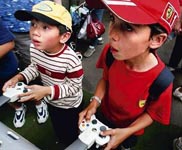Anti-violence video game to teach kids how to resolve conflicts peacefully
 Washington, May 18 : Amidst growing concerns over the disastrous effects of violent videogames on children, a University of Maryland and Human Development Professor has helped develop a new video game that teaches youngsters the principles of peace and non-violence.
Washington, May 18 : Amidst growing concerns over the disastrous effects of violent videogames on children, a University of Maryland and Human Development Professor has helped develop a new video game that teaches youngsters the principles of peace and non-violence.
Professor Melanie Killen and then-doctoral student Nancy Margie spent months working with interactive gaming veteran F. J. Lennon and his team - including animator Dave Warhol - as they developed Cool School: Where Peace Rules.
"I was brought in as a developmental psychology consultant to create the conflict scenarios and conflict resolution options in the video game as well as to provide feedback about the developmentally appropriate nature of the text, the game, and the characters," said Killen.
The Federal Mediation and Conciliation Service (FMCS), The University of North Texas and the University of Southern California were involved in the game's development.
The FMCS has a federal mandate through its youth initiative to combat school violence and bullying by teaching conflict resolution skills in at-risk schools.
Cool School is a whimsical, interactive game "designed to teach children about conflict resolution in a lively, fun, entertaining, and developmentally appropriate context."
Students "journey to the fanciful world of Cool School, where everything from erasers to desks to books to basketballs are alive and full of personality."
The player gets to experiment with different solutions to the conflicts, eventually progressing through 10 levels and 52 different scenarios that Prof. Killen and Margie developed. Tested at school locations in Illinois, it's already received high praise - by teachers, parents and students alike.
Cool School runs on both Windows PCs and Macs (OS X), and is available as a free download from http://www.curriki.org - an online nonprofit social entrepreneurship organization aimed at educators.
Prof. Killen has spent more than two decades investigating peer conflicts, and has recently researched how young people react to and evaluate video games. She is enthusiastic about the game and says it can be a wonderfully positive tool for young students.
"Not only does it provide educators with a developmentally appropriate tool to enable children to learn constructive and prosocial methods for resolving peer conflicts, it also provides children with the opportunity to play a video game that has positive goals, images, and messages while being fun and entertaining,” she said.
With Cool School, Killen says the FMCS has provided a computer game that can help make a difference - in a format young children aged 5 to 7 and their parents - can understand and embrace.
"We hope that this game raises the bar on the type of content that parents can expect to be in the games that their children play. Too often, parents are closing their eyes to the content that their children are engaged in when playing games,” she said, adding that they hope to have versions for different age groups in the future. (ANI)